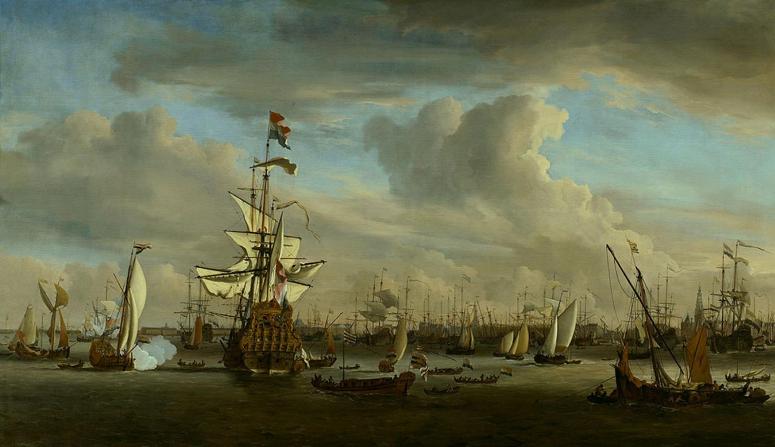Charles II (1630 - 1685). Charles II was king of England, Scotland, and Ireland. He was king of Scotland from 1649 until his deposition in 1651, and king of England, Scotland and Ireland from the 1660 Restoration of the monarchy until his death. He is represented in art as a regal, charismatic monarch who restored the monarchy after the English Civil War. Portraits often emphasize his majesty and authority, depicting him in rich robes, adorned with the Crown Jewels, and surrounded by symbols of kingship, such as the orb and scepter. In formal paintings, such as those by Sir Peter Lely, Charles is portrayed in elaborate court attire, with flowing wigs and a confident, poised expression, reflecting the splendor of his court and the restoration of the monarchy. Art from his reign also reflects his reputation for patronizing the arts and sciences, and sometimes hints at his personal charisma and his well-known indulgent lifestyle, with subtle nods to his courtly charm and numerous mistresses. He was the eldest surviving child of Charles I of England, Scotland and Ireland and Henrietta Maria of France. After Charles I's execution at Whitehall on 30 January 1649, at the climax of the English Civil War, the Parliament of Scotland proclaimed Charles II king on 5 February 1649. However, England entered the period known as the English Interregnum or the English Commonwealth, and the country was a de facto republic led by Oliver Cromwell. Cromwell defeated Charles II at the Battle of Worcester on 3 September 1651, and Charles fled to mainland Europe. Cromwell became virtual dictator of England, Scotland and Ireland. Charles spent the next nine years in exile in France, the Dutch Republic and the Spanish Netherlands. A political crisis that followed the death of Cromwell in 1658 resulted in the restoration of the monarchy, and Charles was invited to return to Britain. On 29 May 1660, his 30th birthday, he was received in London to public acclaim. After 1660, all legal documents were dated as if he had succeeded his father as king in 1649. Charles's English parliament enacted laws known as the Clarendon Code, designed to shore up the position of the re-established Church of England. Charles acquiesced to the Clarendon Code even though he favoured a policy of religious tolerance. The major foreign policy issue of his early reign was the Second Anglo-Dutch War. In 1670, he entered into the Treaty of Dover, an alliance with his cousin King Louis XIV of France. Louis agreed to aid him in the Third Anglo-Dutch War and pay him a pension, and Charles secretly promised to convert to Catholicism at an unspecified future date.
more...













